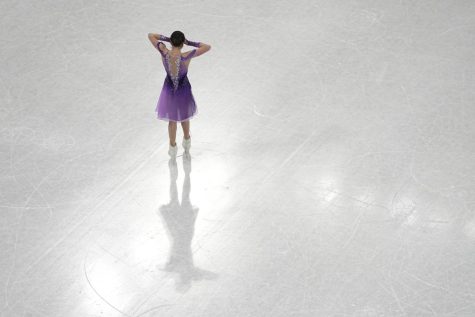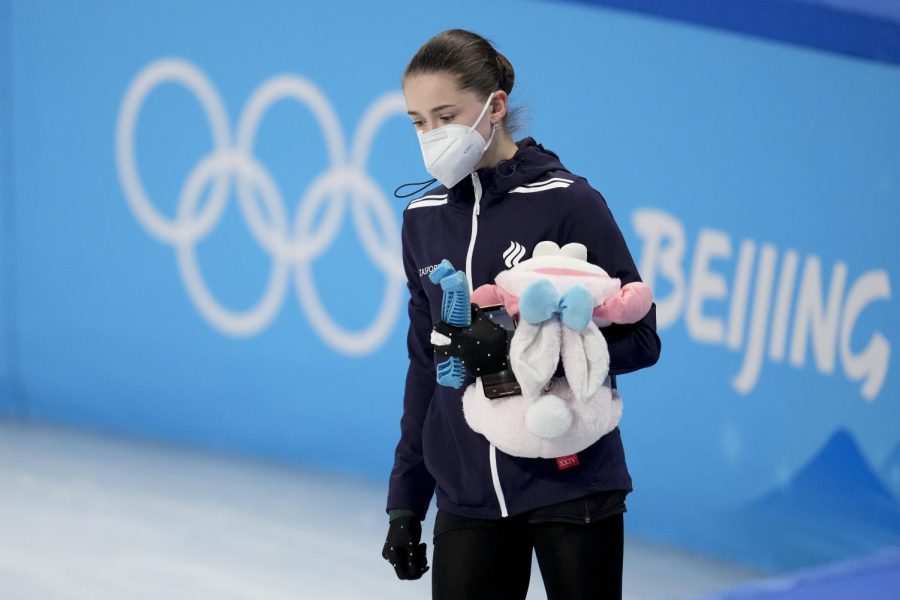Editorial | The Olympics needs an age floor for competitors
Russian ice skater Kamila Valieva after a training session last Sunday in Beijing.
February 21, 2022
Kamila Valieva, an Olympic figure skating competitor for the Russian Olympic Committee, was poised to take home a gold medal. Despite being just 15 years old, Valieva may never compete in another Olympic Games.
This all comes after the shocking discovery of a positive doping test, but due to the exceptional circumstance of her being a minor — categorizing her as a “protected person” under the World Anti-Doping Code — she was still able to compete. Given that she would not face penalization from the International Olympic Committee, this has caused people to speculate that her “entourage” may have provided her with the drug found in her system.
The Olympics do not have standardized age criteria, with officials instead allowing each sport to determine its own rules, seemingly creating a system that can enable people to exploit children for national recognition, all without consideration of the athletes’ well-being. The Washington Post reported Valieva’s coach, Eteri Tutberidze, has a reputation for “running an unforgiving and risky program that critics say drives to stardom and then discards teenage skaters, who have left the sport with severe injuries and reported lasting eating disorders.”
It’s like the world has allowed the spirit of competition to surpass the well-being of children.

(AP Photo/Jeff Roberson)
Since Russia subjects their skaters to seemingly egregious training, their bodies are so overworked by the time they compete at one Olympic Game that they are simply unable to exert the same physical performance ever again.
CNBC reported that Russia’s figure skating program, headed by Tutberidze, “… cycles through talent like no other,” with these Beijing Games marking the fourth straight Russian women’s team with no Olympic veterans.
A post from Ohio-based Nationwide Children’s Hospital claims that prolonged exposure to stress has the potential to change brain chemistry, brain anatomy and even gene expression in children. Toxic stress can lead to lifelong problems in learning, behavior, and both physical and mental health. If this is the reality that child Olympians may face, is it worth it for them to compete?
Peter Donnelly, a professor and director at the University of Toronto’s Centre for Sport Policy, told CNBC that he thinks it’s “unlikely” that Valieva will become a repeat Olympian, “especially with the mental trauma she’s gone through in the last few days.”
Although Russia is notable for its young Olympic competitors, especially figure skaters, other countries, including the United States, have a history of sending minors to compete.
The youngest American gymnast to win gold at the Olympics was 14-year-old Dominique Moceanu, a competitor during the 1996 Games. The youngest competitor this year for the United States is Alysa Lui, a 16-year-old figure skater and two-time national champion from California.
Chloe Kim, an Olympic champion snowboarder, qualified to compete in the 2014 Sochi Winter Olympics, but because of the age restrictions for her events, she was unable to compete until the next Games in 2018.
“Looking back on it, I’m really glad I couldn’t go,” Kim told TIME. “I don’t know how my 13-year-old self would have dealt with it.”
Even though Kim now knows her younger self couldn’t have coped with the stress of being a child Olympian, should any child be put to that test? The case of Valieva has demonstrated to the world the seeming lengths that people will go to when producing champions. The Olympics need to place age minimums for competitors to help prevent the potential for abuse.








